It’s about 5 PM, and the temperature is -20℉ and dropping. Despite this, steam is pouring off of me after four hours of near-continuous cross-country skiing, interspersed with “snubbing” – helping the team ease our 450-pound dogsleds down a steep hill via a frantic game of tug-of-war with gravity, using the “snubline” emerging from the back of the sled.
We’ve just reached our camping spot, which is a snow-packed cove on the frozen Kawishiwi River. We have about four hours of work ahead of us: we have to tromp back into deep forest to harvest a comically large amount of dead wood, feed and care for our eleven sled dogs, chop a hole in the 18 inch-thick ice for our water supply, boil no fewer than five pots of water for several different purposes, and set up a canvas tent in which to huddle together when it gets really cold later.
A flurry of activity starts up as the sleds are unpacked. For a few seconds, while struggling to put on my heavy “choppers” (wool mittens encased inside an increasingly-inflexible leather shell), I gape dumbly at my crewmates as they sling bags and tarps and cookware across the snow.
What am I even doing here?
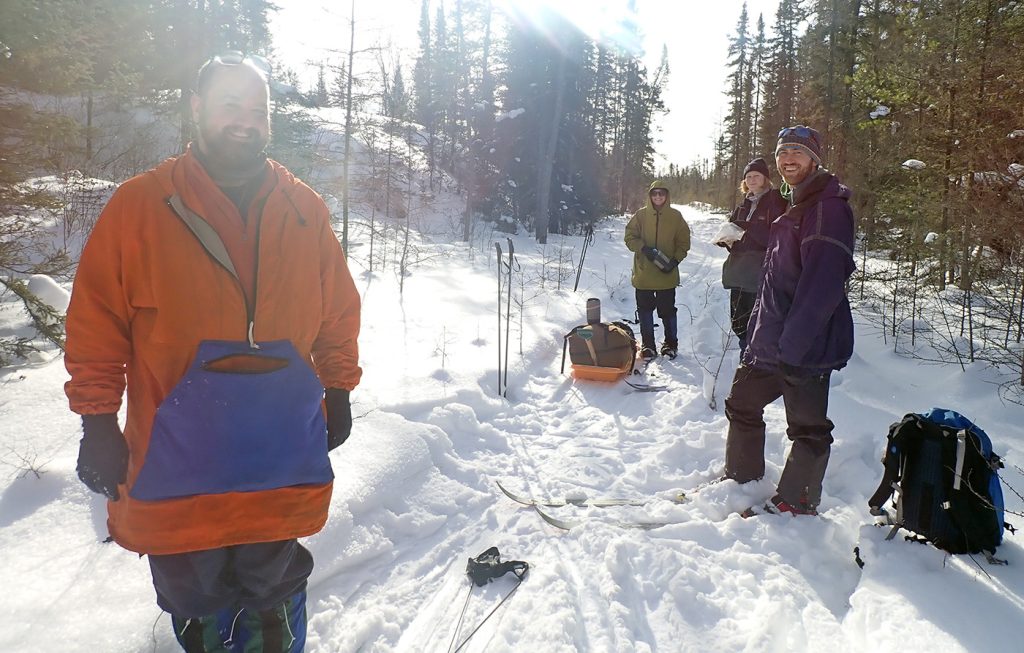
Back in September 2021, when I was approaching the one-year mark of my tenure as Director of Development at POBS, I signed up for a staff expedition with our sibling organization, the Voyageur Outward Bound School, located in Minnesota. VOBS runs a wide array of courses, including backpacking and canoeing in the Big Bend region of Texas, but the “Boundary Waters Dogsledding and XC Skiing” listing caught my attention. (The Boundary Waters is a huge expanse of federally protected wilderness area, encompassing a maze of forests, lakes, and rivers near the U.S./Canada border in Minnesota.) I thought to myself, “if I’m going to try to recreate the experience our students have out on course, this expedition should sound daunting.”
Just for background, here are some salient facts about me at that time:
- I’d never camped out in the winter, let alone in the mind-bending cold of Northern Minnesota.
- I hadn’t cross-country skied in 20 years.
- I worked a desk job, and – being fully honest here – I was not in amazing shape.
- I was scared of dogs.
The last fact, precipitated by some harrowing experiences delivering The Boston Globe as a tween, seemed to push me over the edge: I should do this. It would be really hard, and a little scary, but that would, of course, be the point. I went online and signed up.
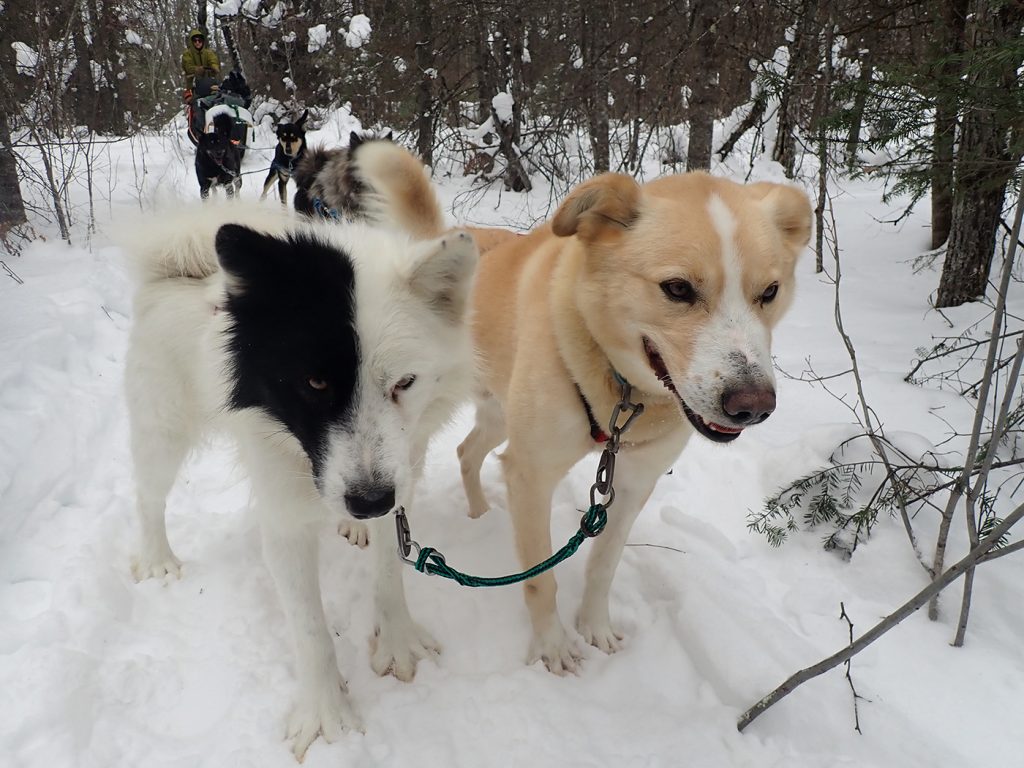
We arrived at Home Place, the VOBS basecamp near Ely, MN, and started a “duffel shuffle” – looking through our gear, borrowing as needed from the communal supply, packing and repacking. I was fitted for two nesting sleeping bags – a standard mummy bag and a gargantuan outer bag. Wyatt, one of our two instructors, demonstrated how to get in and out, sticking one un-booted foot in at a time, wrestling your outer layers on and off in the confined space of the bag.
Although we weren’t heading out on trail until midday the next day, we went out to the back porch to sleep outside that night, slipping a Nalgene bottle full of hot water into our bags for added warmth. I worked myself into a lather wriggling into the two bags, and then found that I had too many layers on and spent the evening venting the bag, getting cold again, and zipping up – a cycle I repeated a few dozen times. The thermometer outside read 1℉.
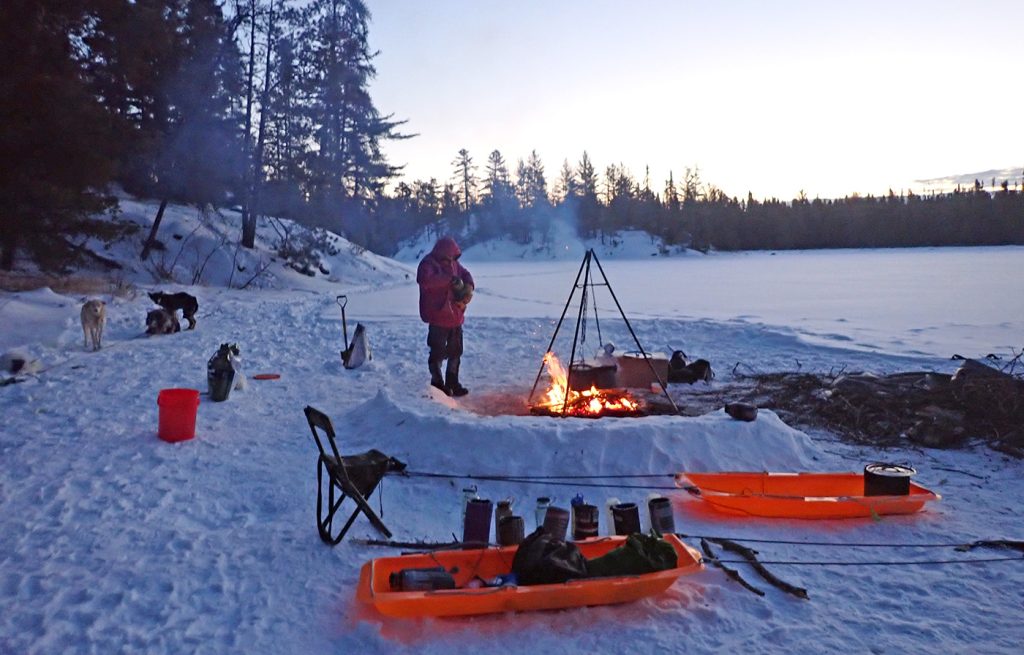
The next morning, we loaded up our two dogsleds, taking care to distribute the bulk of the weight toward the back of the sled and low to the ground. I’d chosen to ski that day, so I strapped on my 195 cm backcountry skis and headed down with the sleds and the rest of our crew to meet our dogs.
The dog yard is massive – a giant planned community of little, colorful dog houses. We could hear it before we saw it. Every kind of conceivable sound a dog could make emanated from beyond the gate – barking, growling, howling, snorting. The noise reached a fevered pitch when we arrived with the sleds – several of the dogs leapt atop their houses to better command our attention.
I shuffled nervously past several rows of dogs and unchained Amoo, a four year-old with a puppy’s energy. Pulling him over toward the sled was like trying to corral a 1st-grader who’d just mastered the pogo stick; he lunged back and forth, greeting his yard-mates, as I pulled him toward the snow-covered road. It didn’t feel scary, but it did feel awkward, and I sensed that he sensed that awkwardness.
Back with the skiers, I strapped a “pulk” – essentially a simple rectangular sled with two fiberglass poles attached, which we filled with our duffel bags – to my waist and we headed out across the river toward Crockett Lake, our first-night objective. I took a tumble or two, but the skiing felt good. Every once in a while we’d stop to drink water and reach into our “squirrel bags” – massive ziplocs filled with GORP, dried fruit, salami, and cheese which we ate in lieu of stopping for lunch.
“Was I going to have to be pulled off course on my first Outward Bound expedition?”
From the get-go, the seven “students” on our crew – all Outward Bound staffers who had come here from places across the U.S. – adopted habits of mind around a sense of mutual care and collaboration. The new “how’s it going?” became “how’s your temp?” – shorthand for “take a second and consider whether you still have feeling in your fingers, toes and nose.” We quickly learned that when we were in camp, the greatest gift we could give each other was a job; it was centrally important to everyone’s sense of purpose and well-being that they be of service to the group, and asking someone to help you with cooking, or wood processing, or building a shelter represented the fulfillment of everyone’s individual goals as well as the group’s.
After arriving at the lake, we gathered wood, built a fire, cooked up a rice-and-protein dinner, and – delightedly – took our boots and socks off, setting our steaming bare feet on some dry wood and waving our liners over the fire to dry them out. (Each day, we slipped on “VBLs” – vapor barrier locks – which were clear, sturdy plastic bags meant to keep your feet warm. They would bunch up uncomfortably in your boot in a new way each day, and meant that, along with added heat, your liner socks and feet also enjoyed deep-rainforest levels of humidity. So gross.)
We assembled a two tarp system – a ground cloth and a roof to ward off nighttime snow – and slid into our bags. I slept better. “Maybe I’ve got this”, I thought.
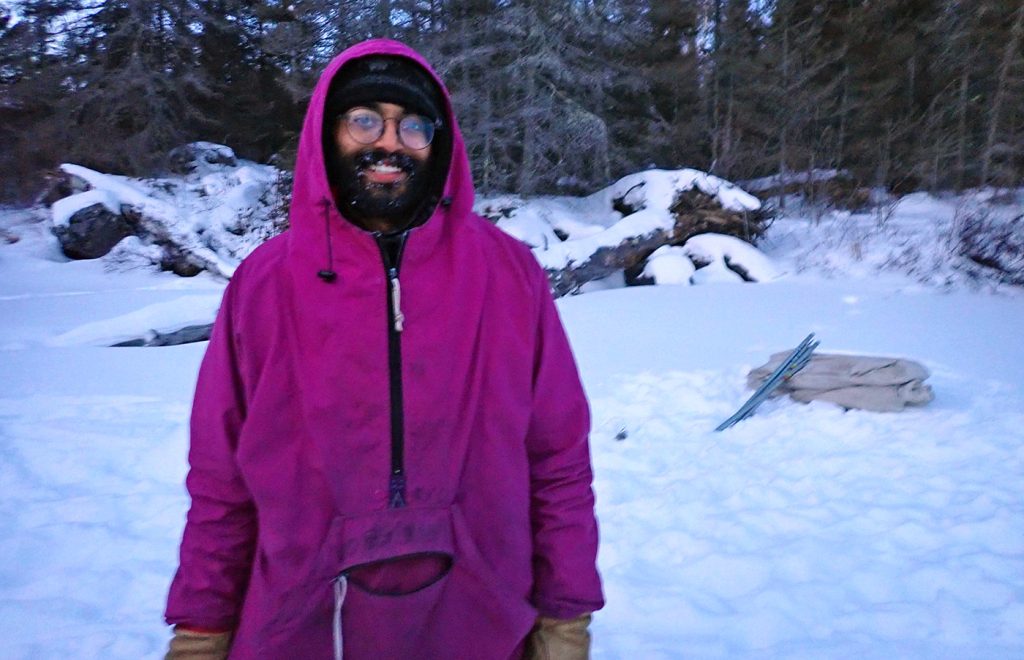
The next day, I volunteered to dogsled.
By midday, I thought: maybe I haven’t “got this.”
The dogsledding was hard. So, so hard. We were following the skiers on a reasonably well-defined track, but on either side lay thigh-deep snow (not to mention rocks and trees). It was possible to stand on the runners over flat ground for a few moments, letting those amazing dogs pull you, a second musher, and 450 pounds of sled at a steady clip – but then, you’d hit a turn or an uphill section (or worst of all, both) and you’d have to jump out into the snow and push the sled.
It felt like doing the most intense kind of basketball drills for 6-7 hours, or treading water with a Shetland pony on your shoulders. After the first couple of segments of our day, I’d stripped all the way down to my base layer, and had come to the brink of throwing up from exhaustion at least twice.
Dan, the longtime VOBS instructor traveling with the dogsleds that day, gave me a few breaks, driving the sled by himself while I plodded and wheezed on foot behind him. It felt awful. I was useless to the team, just dead weight. Late in the day I recovered a little bit of my cardiovascular stamina, but started having muscle spasms in my triceps and twinges in my lower back. This was our first full day, and we still had four days on trail to go.
Was I going to have to be pulled off course on my first Outward Bound expedition? I turned the idea over in my mind. It didn’t seem possible that I could manage much more of this.
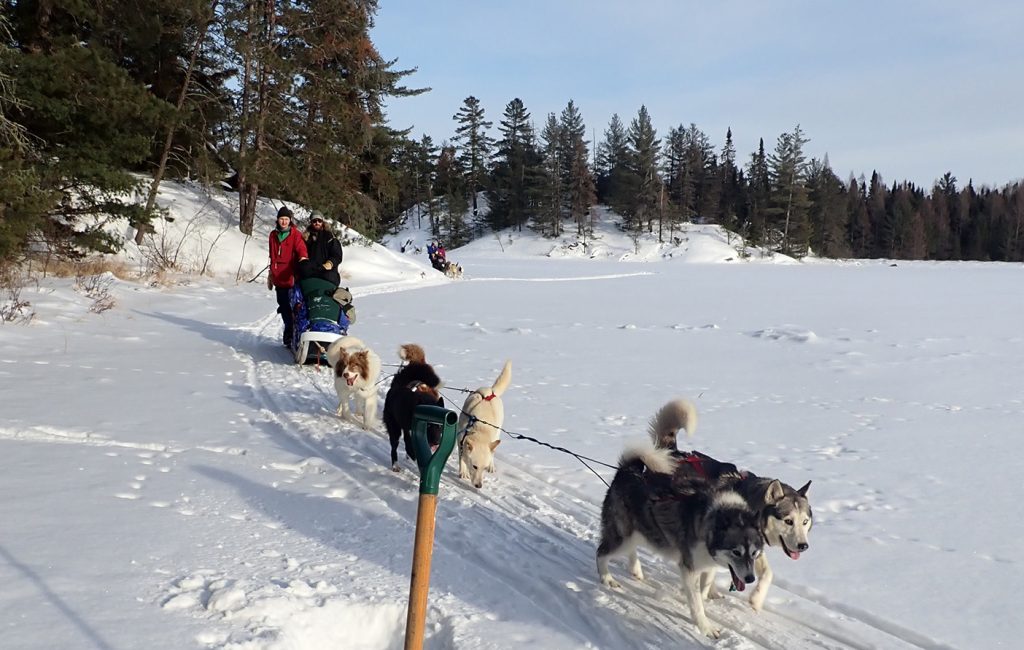
We woke up on Eskwagama Lake the next morning. The night before, Wyatt and Dan had informed us that we’d be doing our “solo day” – a feature of most Outward Bound expeditions wherein students spend time, possibly including a full evening, on their own – before it got even colder later in the week.
After receiving some instruction on building our own fires, melting snow for water, and erecting a tarp shelter for sleep, Dan told us an Ojibwe story (we were traveling on their ancestral lands) about Shingebiss, a grebe who elects to stick it out for the winter instead of flying south. Despite the best efforts of Kabibona’kan the winter-maker, who takes Shingebiss’s continued survival as an affront, he makes it to the spring unscathed, free and unafraid.
Dan dropped me off in another part of the lake with my sleeping bags, a tarp, some twine, some food, a pot, and some matches. He helped me dig out a fire area on the lake, and then moved on.
I trudged back into the woods, sizing up trees to find a good spot for my shelter. After rejecting several possibilities, I found a little clearing where the land made a faint cradle, and tied the tarp to four trees in a way that effectively created a sloping roof, a wall facing the wind, and a floor barrier above the snow.
Plopping my sleeping bag on the tarp, I then spent the next 3-4 hours scavenging all the dead wood I could find: rotting stumps for base logs to protect the fire from the ice; curly spruce ends to produce massive, short-lived yellow flames; birch bark to get things going. When the supply of wood looked scarce in the valley where my shelter lay, I scrambled up a ledge, finding a massive downed tree and throwing 8 foot-long branches down toward the trail back to my cooking spot.
“It feels like empowerment in the truest sense of the word…”
When night fell, I built a log-cabin style wood structure and lit my fire, piling as much wood on as I could without smothering it. In my single pot, I managed to boil just enough water to create a hot water bottle for my bag, make a double serving of ramen, bratwurst, and potatoes, and dry out my feet again.
The coals stayed warm and alight for about 45 minutes after that. I realized that in this day of nonstop activity, the mental habits that had kept me from being fully present had vanished. I wasn’t thinking about my plans for the rest of the winter. I wasn’t worrying about work. I was missing my family, but in a way that felt sweet and reassuring. As the temperature dropped precipitously, I took one more hike out toward the center of the lake to look at the clear night sky, and then scattered the hot ashes and headed to my shelter.
When the first light hit, I felt a sense of release. I’d made it through the night. (Dan later told me that the thermometer hit -20℉ in the early morning, which certainly explained the ice crystals collecting on the rim of my bag, a byproduct of condensation from my breath.)
Since I was hired at POBS a year and a half ago, I’ve been talking and writing a lot about students discovering their own potential – finding out that, to use the Hahn-ian phrase, “there is more in you than you know.” What I didn’t know was that a person experiences this discovery as a kind of freedom, a freedom from fear and self-doubt, an assurance that you can handle what’s next. It feels like empowerment in the truest and most basic sense of the word: to come into your own power.
Another revelation hits you, too, almost inverse to the first one. You realize that while you can survive on your own in these conditions, you can only thrive with your crewmates beside you. The sheer mental weight of all the various activities I needed to accomplish in order to simply stay safe, warm, hydrated, and fed took me to the outer limits of my executive functioning ability. There was a sense of sheer joy in returning, that morning, to the hive of care and collaboration that this group of remarkable people provided.
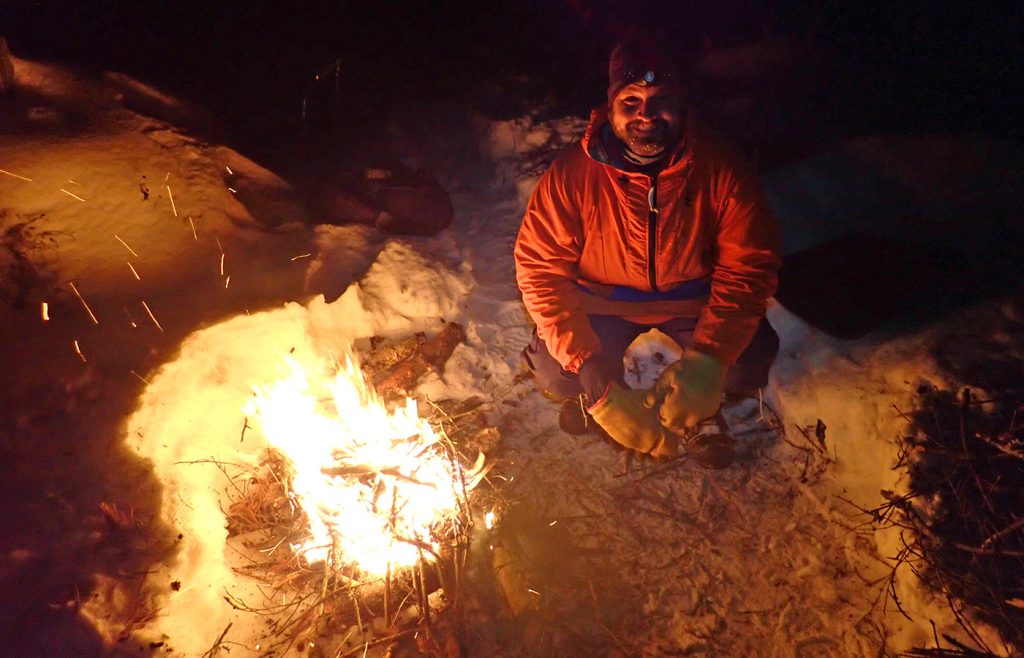
The next night, we are camping out on the Kawishiwi River after a long trek, and after spending a couple of hours eating and conversing in our canvas tent, we head out into the -38℉ evening air, the coldest we’ll experience on the trip. Before bedtime, we usually stand in a circle out in the snow and do some goofy calisthenics to get our body temperature up before we go into our bags.
Tonight, despite the cold, we’re having a dance party. My crewmates are making music-adjacent mouth noises; I am attempting to dust off my beatboxing skills, unpracticed since some college party 20 years ago. It all sounds great to me. We dance, badly but un-self-consciously. The stars are in sharp focus. We’re feeling pretty warm.
John Frisbee joined POBS in October 2020 as Director of Development. All photos by Olivia Lord.
